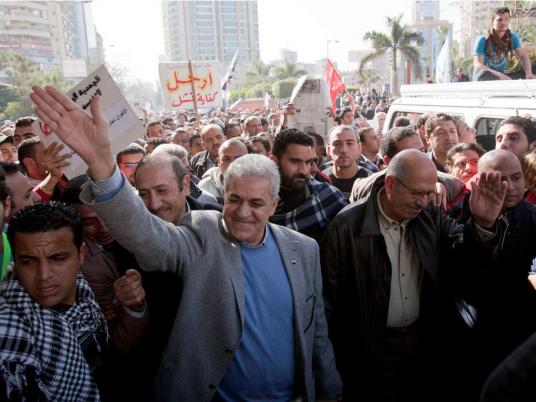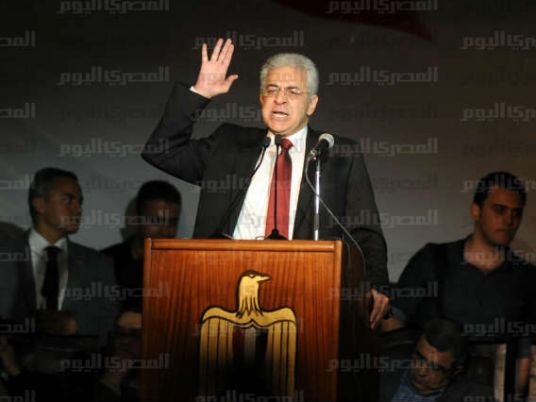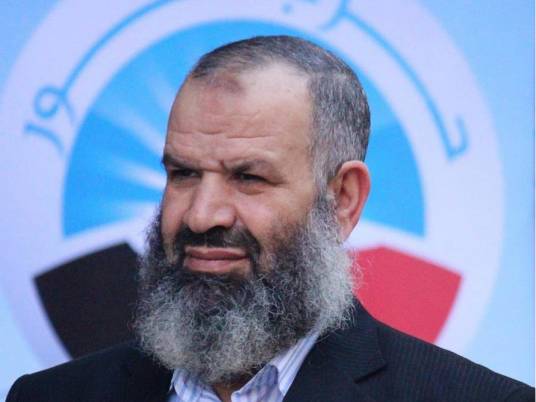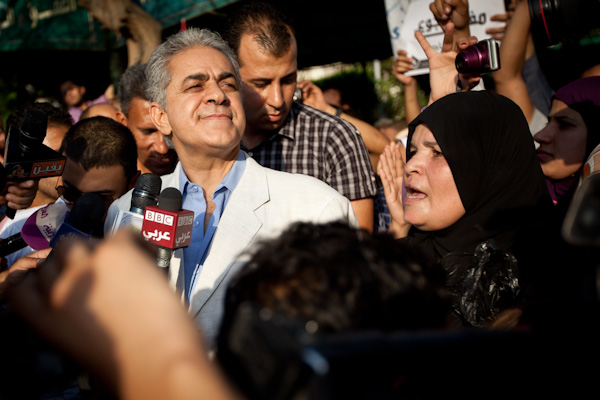
As he sits in the office of the Popular Current in Cairo, waiting to fill out the application to join the movement, retired banker Mohamed Korayem says that, after returning to Egypt following the revolution, it was the only political organization that he thought could represent him.
“It cares about the country and its people, the poor and the rich,” he says.
Korayem, who hails from a Nasserist family, doesn’t hide the fact that his personal respect for Hamdeen Sabbahi is the main reason for his belief in the organization.
“He is clean, his hands are clean and he speaks for the average Egyptian citizen and mirrors his suffering. Also, his political experience ever since he was a student to this day gives him an advantage over the other figures on the scene,” he says.
Sabbahi was the dark horse of last year’s presidential election, winning 4.7 million votes in the first phase of the election, only 2 percent away from making it to the runoff. His popularity was recognized as a force to be reckoned with on the political scene.
Capitalizing on his newly discovered electoral power, he founded the Popular Current last September, a movement with the stated goal of uniting revolutionary groups and furthering the goals of the revolution.
The organization aims to become a civil powerhouse on the political scene, advancing on the street politics front while attempting to gain political power through elections and experimenting with social outreach. Whether it is capable of getting there is questionable, but what’s uncontested, many say, is that it’s managed to make itself present in today’s contentious national political scene, beyond the scope of many traditional parties.
Hassan Abu Taleb, an expert at Al-Ahram Center for Political and Strategic Studies, agrees with many analysts who believe the Popular Current’s appeal lies mostly in its symbol, Sabbahi, rather than its ideas.
As his presidential elections slogan, “One of us,” suggests, Sabbahi’s simple background and demeanor make him more relatable than most politicians to the average Egyptian. His long history of political activism under former presidents Hosni Mubarak and Anwar Sadat also earned him the trust of his supporters.
With Nasserist beliefs, Sabbahi’s political career started as a student leader during his college years. He later became one of the main leaders of the Nasserist movement and one of the most recognizable opposition figures.
Sabbahi was president of the Nasserist Karama Party and a co-founder of the Kefaya movement, which spearheaded protests against Mubarak’s rule in the mid-2000s.
However, his electoral pulling power remained undetermined until the 2012 presidential election.
Abu Taleb says the success of the Popular Current depends on whether it succeeds in turning the personal support for its leader into support for the ideas it stands for, which would be a break from Sabbahi’s Nasserist legacy.
“Historically, some movements start around a person, and then it becomes about the ideas that he adopts. Then it becomes institutionalized — those who believe in this have to promote the ideas, not the person,” he says.
Beyond Sabbahi and his presidential campaign, the group also played politics on the street at the height of opposition to Brotherhood rule, especially after President Mohamed Morsy enacted what was deemed an unpopular power grab through a series of decrees.
In the past months, the group was at the forefront of the organization of anti-Brotherhood and Morsy protests at the presidential palace and in Tahrir Square.
But now that the street politics test is done, the Popular Current’s electoral ability is to undergo another serious test in the upcoming parliamentary elections.
The group has joined the National Salvation Front (NSF), a uniting body for all revolutionary and liberal parties and movements, and will run for the parliamentary elections on the NSF’s list.
Abu Taleb says the votes Sabbahi received in the presidential elections will not necessarily translate into votes for the Popular Current during the parliamentary elections, because the votes in the presidential election were mostly for his personal merits, not the ideals he has brought to the group, in addition to the changes that have occurred in the electoral map.
Meanwhile, Popular Current members say they are reaching out. Heba Yassin, spokesperson for the movement, says they have committees in villages around the country that offer support to people and communicate their problems and needs to leaders.
But she says their outreach transcends the function of electoral goals. “You have to reach out to people in order to know their problems and convince them of your ideas. And then you can create a political arm for them,” she says.
“Our goal is not political. We have social goals that dictate our political agenda,” adds Riyad Haddad, member of the Popular Current media committee, in what is read by some as a deliberate counter to the social agenda of Islamist parties, which they say is primarily aimed at grooming electoral support, rather than welfare.
Yet, like many nascent groups, struggles with internal organization, goals and identity have circumvented full-fledged outreach. Haddad says the group has been unable to realize its aspirations, as it has been moving from one crisis to another in the past months.
But key Popular Current members contend that the choice of staying a movement and not formalizing the group through the platform of a party was deliberately designed to avoid ideological rifts.
Yassin says the group decided to take the form of a movement rather than a party to have a wider appeal as a body beyond ideologies that unites revolutionary groups.
“We could have started a party, but we didn’t want to be identified with one certain ideology. We wanted to be able to contain all ideologies and ideas,” says Yassin.
Akram Ismail, a leftist activist who voted for Sabbahi in the first round of the presidential elections, sees a potential role to be played by the group, but opportunities lost because of the decision to not found a party. “Sabbahi is the center left but he doesn’t want that, he wants to be the popular leader of the revolution transcending parties and that’s not possible,” he says.
He points out that opposition leader Mohamed ElBaradei formed his party Al-Dostour after failing to be effective as a popular leader outside the political order, he says. “The idea is to get over the political polarization between the right and left and to say that you are the revolution, there is competition for this space,” says Ismail.
Abu Taleb concedes that the group, despite its Nasserist leanings, has the ability to appeal to people across the political spectrum. “The main idea is social justice, and not Nasserism in its 1950s meaning. The idea of social justice is something that people, whether moderate Islamist, leftist or Nasserist, can believe in,” he says.
Ismail sees the very Nasserist background of Sabbahi as a reason for the group to proliferate. He says that while all the other leftist parties only appeal to the middle class, Sabbahi has the ability, with his Nasserist background, to compete with Islamists for votes in the Delta where people idolize the former president as the defender of the poor. “In the mentality of people in villages there’s only Islam and Gamal Abdel Nasser,” he says.
This piece was originally published in Egypt Independent's weekly print edition.




